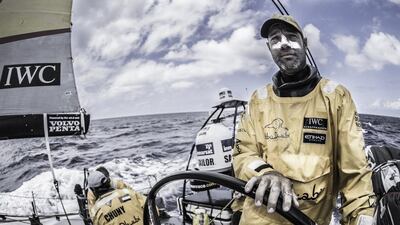On Tuesday, five days ahead of the sixth leg of the Volvo Ocean Race (VOR), one of the official suppliers for the race announced the identity of the best navigator of the fifth leg.
It was a difficult leg across the Southern Ocean, though in five of the six boats completing it, the race and the one-design Volvo Ocean 65 chalked up a collective victory.
The B&G Navigators’s prize is a running contest within the larger contest. Each leg winner receives US$1,000 (Dh3,670) and the overall winner, after the nine legs, U$5,000.
It is a small amount but it should not devalue the significance of its recognition, especially as it is voted upon by navigators in the race. They are not allowed to vote for themselves.
Navigators are, after all, the architects of this race. Their influence has probably even increased this race, with one-design. The speed differences between boats are much smaller than before and much more hinges on making the right navigational decision.
RELATED:
- ‘A strong chance glory awaits’: With Leg 5 win, Azzam control destiny
— Abu Dhabi Ocean Racing arrive in Itajai on top — in pictures
— Towill and Enright’s route to Volvo Ocean Race just like a Disney movie
After overseeing a near flawless leg victory, as well as a record for the fastest sailing in a 24-hour stretch, Azzam’s Si-Fi, known to increasingly fewer people as Simon Fisher, emerged as the winner. On the one hand, it was an inevitable, straightforward choice.
He managed to tame the most untameable stretch of the race after all. But in actual fact, it is a little surprising that he has been recognised.
It is not because he does not deserve it. He does and has for a few legs now.
We are five legs deep into the race. Azzam and Fisher have won two, been on the podium every other leg, finished podium on every in-port race bar one and yet Fisher had not been seen as the best navigator.
Pascal Bidegorry, the French navigator for Dongfeng Race Team has won it three times, including for the second leg where he shared it with Andrew Cape of Team Brunel.
The leg four prize was shared by Libby Greenhalgh of Team SCA and Bidegorry’s replacement Erwan Israel. So just on previous form alone, it is surprising that the navigators broke from habit and awarded it to Fisher, the guy who has been overseeing his team’s success.
Deeper currents are probably at play. The official criteria for the prize states it “will be awarded to the navigator who, in the opinion of the judging panel, has made the most effective use of meteorological, oceanographic and geographical information to gain distance on the majority of the fleet.”
Navigators who best use their craft, it continued, will be lauded. Yet, until now who wins has felt like a conclusion to that one debate we never tire of: Do we want — and laud — style or substance? Form or function?
Every navigator has his own method, but broadly speaking, there are navigators who make big, bold moves and navigators who prefer to play it safer and more conventional, although in ocean sailing, there is little scope for conventionalism.
Some chase the weather, a riskier, radical strategy. Others make sure they stay consistently with the fleet and make decisions based on other boats.
Fisher sees himself as part of the latter, though with the caveat that should the situation arise, he can stick his neck out with the best of them. The award had hitherto plumped for style, preferring to identify a big, flashy move in the leg which won them over.
Revealingly, every time Fisher has been asked after legs to identify the big pivotal decision he made he has had the same answer.
Not one big one, but a series of small ones that helped Azzam get things right.
And small, non-flashy decisions, even if they help you win, do not attract as much attention as the bold one that gets a boat close even if not, ultimately, close enough.
That is very much part of the identity that Azzam has acquired. They are not the most romantic story in this race.
They are not the youngest crew. They are not an all-female crew. They have not been part of a dramatic storyline.
They are, mostly, hardcore, ruthless professionals, out there to win the world’s toughest race. Like Fisher’s major decisions, it may be safe and less noticed, but can anyone argue that it is not working?
And if Azzam do end up winning the entire race, it will be as difficult to argue that Fisher has not been the best navigator.
FOLLOW US ON TWITTER @NatSportUAE

